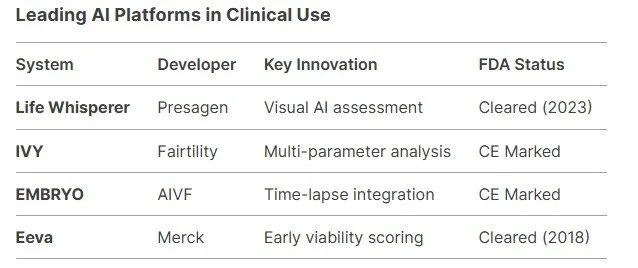The Future of IVF: How AI is Revolutionizing Embryo Grading and Selection
The New Frontier of Embryo Assessment: Beyond the Microscope
Modern IVF labs are undergoing a technological revolution, with cutting-edge systems replacing traditional embryo evaluation methods. Leading fertility companies are now deploying intelligent time-lapse incubators and AI-powered selection tools that provide unprecedented insights into embryo viability. Here's how these innovations are changing outcomes for IVF patients.
Companies are combining years of research data on embryo timeline and morphology with AI to make decisions on future outcomes. Is that crazy or genius?
How AI Systems Evaluate Embryos
Beyond Human Perception: What AI Detects
Morphokinetic Patterns: Precise timing of 17+ developmental events
Micro-Morphology: Subcellular features like organelle distribution
Growth Dynamics: Rate changes between developmental stages
Predictive Markers: Correlation of early patterns with blastocyst quality
AI Embryo Selection: The Algorithm Advantage
AI has emerged as a transformative tool in embryo selection, offering objective and standardized assessments to aid embryologists in identifying embryos with the highest implantation potential.
Notable AI-driven solutions include:
AIVF's EMA™ Platform: This AI-powered system evaluates embryo viability by analyzing biological data from embryos from Day Zero (fertilization) to Day 5 or Day 6, scoring them based on their probability of successful implantation and pregnancy. The platform aims to standardize embryo evaluation, reducing human subjectivity and improving IVF success rates.
Life Whisperer: Focused on improving IVF outcomes globally, Life Whisperer utilizes AI to assess embryo images, assisting clinicians in selecting the most viable embryos for transfer. Their mission is to make this technology accessible and affordable worldwide.
MIM Fertility's EMBRYOAID®: An AI application designed to assist with swift evaluation of the most viable embryos based on images and time-lapse imaging, aiming to deliver effective IVF care with expert-level AI.
Proven Advantages Over Traditional Methods
Clinical Performance Metrics
31% higher live birth rate vs conventional grading (RMANJ 2023 study)
92% accuracy in predicting blastocyst formation (vs 70% human)
19-hour earlier aneuploidy prediction than PGT-A results
Operational Benefits
Reduces inter-embryologist variability by 83%
Cuts embryo evaluation time from 15 minutes to 30 seconds
Enables 24/7 consistent assessment quality
Costs
Of course, no service is free in this world. The companies charge the clinic, who will likely charge the patient a few PER cycles. There are pros and cons of course and in the long run, it might actually help save money. Nothing is perfect so can we really rely on AI to select the best embryos?
The AI Selection Process: Step-by-Step
Data Acquisition
Time-lapse images (every 5 min)
3D structural reconstructions
Metabolic activity measurements
Feature Extraction
100+ morphological parameters
40+ timing parameters
15+ symmetry/texture metrics
Predictive Analysis
Compares to database of 500,000+ embryo outcomes
Generates viability probability score (0-100%)
Clinical Integration
Ranks embryos by implantation potential
Flags abnormalities for review
Documents decision rationale
Real-World Impact on IVF Outcomes
At NYU Langone Fertility Center
45% reduction in time-to-pregnancy
28% decrease in transfers needed per live birth
$12,000 average savings per successful pregnancy
In Male Factor Cases
Corrected 82% of false-positive poor grades
Identified 63% more viable embryos than morphology alone
Addressing Common Concerns
Myth: "AI will replace embryologists"
Reality: Acts as decision-support tool - final selection remains with clinician
Myth: "Too experimental for routine use"
Reality: FDA-cleared systems now used in 23% of US IVF clinics
Myth: "Only helps with perfect embryos"
Reality: Most valuable for borderline/good quality cases
Patient Takeaways
✔ Ask if your clinic uses validated AI systems
✔ Request an explanation of your embryo viability scores
✔ Understand how AI complements (not replaces) embryologist expertise
✔ Consider AI-selected embryos may have higher success with single-ET
While AI offers substantial advancements in embryo grading and selection, ongoing research is essential to validate its efficacy across diverse populations and clinical settings. Ethical considerations, such as ensuring equitable access and addressing potential biases in AI algorithms, are critical for the responsible implementation of this technology in reproductive medicine.
AI is poised to revolutionize embryo grading and selection in IVF, providing more accurate and consistent evaluations that enhance the likelihood of successful pregnancies. As technology continues to evolve, its integration into clinical practice holds great promise for improving outcomes in assisted reproductive technologies. Is the future now?
“Did you know her baby was selected by a computer?”

